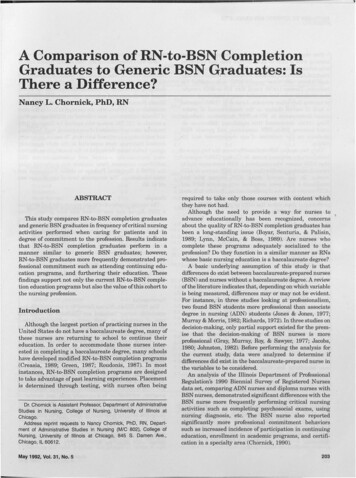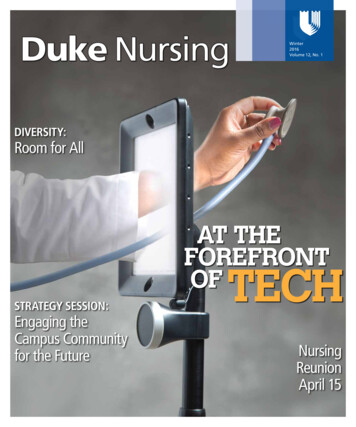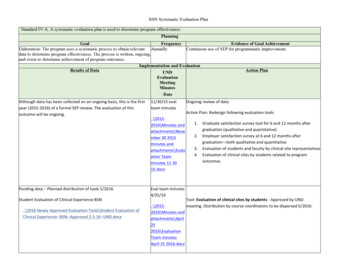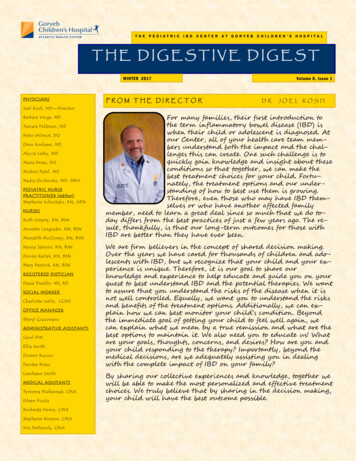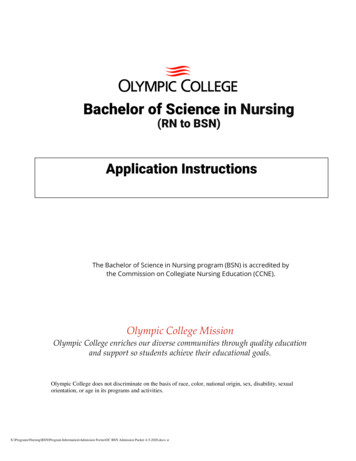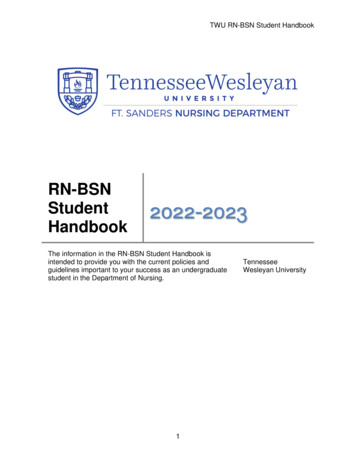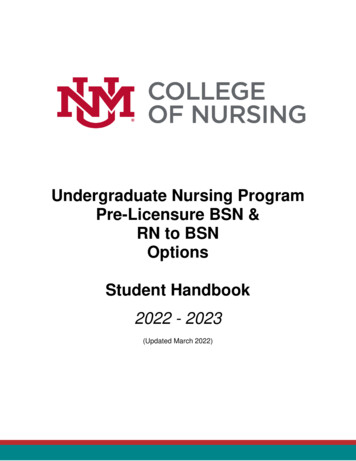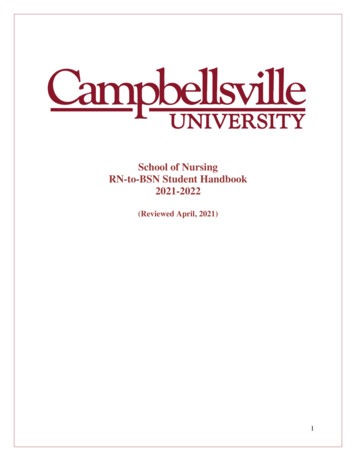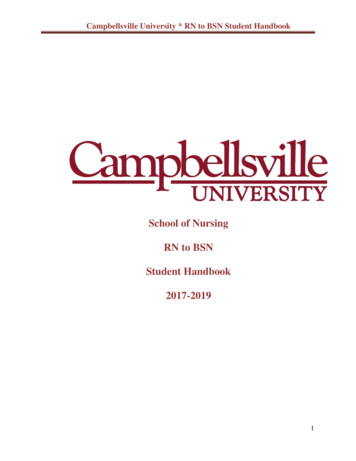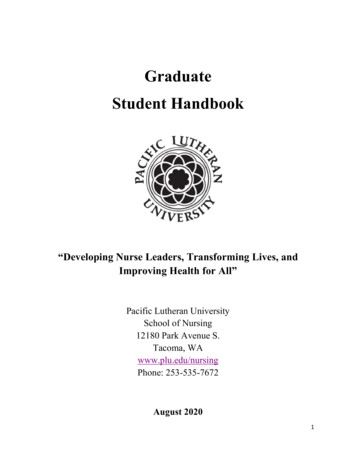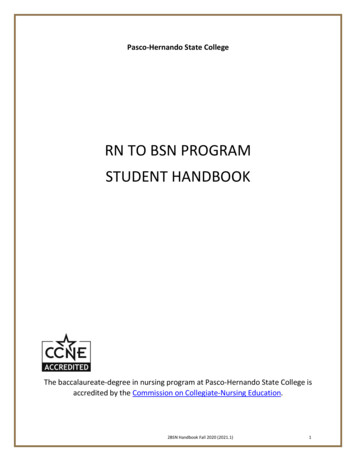
Transcription
Pasco-Hernando State CollegeRN TO BSN PROGRAMSTUDENT HANDBOOKThe baccalaureate-degree in nursing program at Pasco-Hernando State College isaccredited by the Commission on Collegiate-Nursing Education.2BSN Handbook Fall 2020 (2021.1)1
1RN TO BSN NURSING PROGRAM OVERVIEW . 151.161.171.182RN TO BSN STUDENT POLICIES . .152.162.172.182.192.202.213MISSION STATEMENT.3PURPOSE .3NURSING PHILOSOPHY .3NURSING EDUCATION .3DEFINITION OF NURSING SCHOLARSHIP .4DEFINITION OF SCHOLARLY WRITING .4THE RN TO BSN PROGRAM WILL REFLECT THE FOLLOWING PROGRAM LEARNING OUTCOMES: .4GENERAL EDUCATION REQUIREMENTS (36 CREDITS) .5FOREIGN LANGUAGE:.6GEN-ED COURSES REQUIRED TO COMPLETE BSN DEGREE AUDIT.6COURSE SEQUENCE .6STUDENT STATUS: FULL TIME OR PART TIME .8FACULTY MENTOR RELATIONSHIP.8CLINICAL LAB COMPONENT COURSE (NUR3065C) .8CLINICAL IMMERSION EXPERIENCES (CIE) COURSES: REQUIRED ELEMENTS .8PRECEPTOR ROLE CRITERIA .9RECIPROCITY OUT OF STATE STUDENTS .9NURSING DEPARTMENT ORGANIZATIONAL CHART: RN TO BSN PROGRAM .9CODE OF ACADEMIC AND CLINICAL INTEGRITY.12INSURANCE COVERAGE .13DISABILITY STATEMENT .13ONLINE CLASS ENVIRONMENT ATTENDANCE .13CIE HOURS .14CIE INTERACTION POLICY.14CIE EVALUATION PROCEDURES .14ONLINE TESTING – RN TO BSN PROGRAM .14GUIDELINES FOR WRITTEN ASSIGNMENTS .15STUDENT EVALUATION/GRADING.16GRADING SCALE.16PROGRESSION IN THE PROGRAM .16STUDENT: INTERACTION WITH BSN INTERDISCIPLINARY TEAM.16RE-ADMISSION TO RN TO BSN PROGRAM PROCEDURES FOR STUDENTS .16STUDENT LEAVE REQUEST .17GRADUATION .17CONDUCT .17FACULTY STUDENT CONFERENCES .17DISMISSAL FROM THE HEALTH PROGRAMS .18TRANSFER PROCEDURES FOR RN TO BSN NURSING PROGRAM .18COLLEGE SERVICES .18RN TO BSN PROGRAM ACCREDITATION AND STUDENT NURSES ASSOCIATIONS . 183.1ACCREDITATIONS .182BSN Handbook Fall 2020 (2021.1)2
1 RN TO BSN NURSING PROGRAM OVERVIEW1.1 MISSION STATEMENTThe RN to BSN program at Pasco-Hernando State College (PHSC) serve to support and assist in implementingthe philosophy and objectives of the college through the promotion of the professional registered nurse utilizingthe innovative learning principles of: imagine, believe and achieve. Faculty interacts with studentsincorporating creative technologically advanced interactive environments to facilitate learning outcomes.The program is delivered in an online environment with two required clinical immersion experiences. Healthpromotion, teaching and learning, community and global parameters, research concepts and leadership skillsare interwoven into the curriculum to help develop the multifaceted role of the professional nurse. Graduatesof the program will be able to demonstrate: clinical judgment, critical thinking exemplars,organizational/leadership management, research and content specific nursing discipline knowledge.1.2 PURPOSEThe RN to BSN Program will:l.Improve content specific nursing discipline knowledge base of the professional nurse.2.Continue to reinforce the professional nurse’s pathway towards lifelong learning.3.Provide a rich comprehensive liberal arts background to support professional nursing practice.4.Provide opportunities for further professional growth in areas related but not limited to: clinicaljudgment, critical thinking exemplars, organizational/leadership management and research.1.3 NURSING PHILOSOPHYThe philosophy of the RN to BSN nursing faculty is based on the belief that nursing faculty is here to provide alearning environment that looks to support and build on student strengths and to nurture student’s imaginationfostering development of student’s professional development. By working together, faculty and students canimagine, believe and ultimately achieve educational learning goals1.4 NURSING EDUCATIONThe nursing faculty believes that nursing education is constantly transforming as a result of increasedtechnology, advances in scientific theory and clinical practice, and the ever changing attributes of the studentteacher/student-learner relationships. With the emergence of evidenced based practice methods, clinicalstandards have been amended leading to a more rigorous standard of clinical practice and expectation ofprofessional practice. Nursing education continues to feel this transformational change as both faculty andstudent participate in the shared learning environment.The nursing faculty believes that the delivery method of on line instruction is suitable and applicable to theattainment of the RN to BSN degree as it seeks to expand development of professional nursing practice. Thefaculty and student learner must take an active role in the shared on line community, working collaborativelyto foster interdependent practice. The online learning environment represents an active/interactivecommunity and as such all participant members are able to share, build on and develop professionalrelationships which will exist beyond the computer screen.The nursing faculty believes that clinical immersion experiences will help students to organize learned didacticinformation applying it to management/organizational models in a variety of practice settings. Through thementoring process of a defined preceptor relationship, the nursing faculty believes that RN to BSN students will2BSN Handbook Fall 2020 (2021.1)3
realize improved critical thinking exemplars in conjunction with improved clinical judgment. Thus, the RN toBSN graduate will be able to imagine, believe and achieve using the foundational framework of the program tofurther advance their professional nursing practice.The nursing faculty believes that by working in a collaborative interdependent relationship with its RN to BSNstudents, that professional nursing practice can be demonstrated as a model of excellence. The commitmentof the nursing faculty to their students will help them to apply, analyze and synthesize information to supportnot only their individual nursing practice but to promote and strengthen the professional role of nursing practice.1.5 DEFINITION OF NURSING SCHOLARSHIPThe efforts whereby an individual or group of individuals applies learned knowledge in order to promoteprofessional growth of a discipline. The efforts (activities) include but are not limited to: clinical practice,writing for professional journals; participating in review/edition/writing of textbooks; attendance atconferences to engage in critical thinking/learning activities; participating in community, national andinternational associations, and participating in research development of educational engagement/mentoringactivities to improve learning outcomesFurthermore, the Nursing Faculty believes that it is imperative to provide learning opportunities for bothfaculty and students to participate in the pursuit of nursing scholarship activities so as to improve both studentand professional outcomes.1.6 DEFINITION OF SCHOLARLY WRITINGScholarly Writing is a requirement of the RN to BSN Program. Students are expected to submit writingreflective of the scholarship method that incorporates the use of research and planning to arrive at a wellthought out logically driven analysis of the discussion of content. As students proceed through the program,focus will be directed on building and improving their individual ability to produce scholarly writing examples.1.7 THE RN TO BSN PROGRAM WILL REFLECT THE FOLLOWING PROGRAM LEARNINGOUTCOMES:Build a content specific knowledge base relative to the nursing discipline for application to professionalnursing practice inclusive of cultural awareness, life cycle continuum and focusing on patient safety atindividual, family, groups and population levels.Enhance therapeutic communication skills via a variety of modalities resulting in attainment ofinformational literacy and technological fluency.Incorporate and apply information obtained from General Education courses (Liberal Arts background) tosupport professional nursing practice.Utilize critical thinking skills to enhance content analysis and interpretation of clinical/didactic findingsthat are reflective of scholarly work.Develop an organized pathway towards the assessment of research (methodology and findings) that isinclusive of Evidenced Based Practice (EBP), qualitative and quantitative reasoning.Be aware of the changing dynamics of healthcare and economic policies as they apply to healthpromotion measures and the delivery of healthcare services on individual, family, community, nationaland global levels.2BSN Handbook Fall 2020 (2021.1)4
Apply and display leadership skills to enhance recognition of professional nursing practice by completionof preceptor/mentor learning experiences.Maintain professionalism by demonstrating regard for legal and ethical standards as they apply toStandards of Care and Scope of Practice.Reinforce one’s commitment to life-long learning so as to enhance professional nursing practice as aprovider in the delivery of care to all patients who are placed under your care.1.8 GENERAL EDUCATION REQUIREMENTS (36 CREDITS)Students must satisfy all general education requirements prior to graduation. Students should meetwith an advisor to determine if acceptable substitutions may satisfy some or all of PHSC’s generaleducation requirements.General Education course requirements are subject to change based on Florida Department of Education(FDOE) policies.Area I: Communications (9 credit hours)ENC 1101 - English Composition IENC 1102 - English Composition IISPC 2608 - Introduction to Public SpeakingArea II: Mathematics (6 credit hours)MAC 1105 - College Algebra (or any Area II mathematics course listed in the Associate in Sciencedegree program requirements)STA 2023 - Introduction to Statistics (Prerequisite for NUR4164 Nursing Research and Informatics)Area III: Natural Sciences (6 credit hours)BSC 1085 - Human Anatomy and Physiology I and BSC 1085L - Human Anatomy and Physiology ILaboratoryBSC 1086 - Human Anatomy and Physiology II and BSC 1086L - Human Anatomy and Physiology IILaboratoryArea IV: Social and Behavioral Sciences (6 credit hours)PSY 1012 - Introduction to PsychologyAny 3 credit hour course in Area IV listed in the Associate in Science degree program requirements.Area V: Humanities (6 credit hours)PHI 1630 - Applied Ethics (Prerequisite for NUR3826 Legal and Ethical Issues in Nursing)Any 3 credit hour course in Area V listed in the Associate in Science degree program requirementsArea VI: Information Literacy and Technology Fluency (3 credit hours)CGS 1100 - Microcomputer ApplicationsTechnical Courses from AS Nursing Degree —Students will also need the followingadditional courses if not previously taken:2BSN Handbook Fall 2020 (2021.1)5
DEP 2004 - Lifespan Development (3 credits)MCB 2010 – Microbiology (3 credits) and MCB 2010L - Microbiology Laboratory (1 credits)HUN 2201 - Science of Human Nutrition (3 credits)This information is also list in the college catalog and on the Bachelor of Nursing Website.Academics, programs and careers in health science nursing bachelor scienceCatalog and Student Handbook1.9 COURSE SEQUENCENursing courses in the RN to BSN program at PHSC are offered as individual BSN courses and courses offeredmay vary during each semester, fall, spring, and summer semesters. In order to progress in the program, theRN to BSN student must pass the NUR3065C course with a C or higher. Students not meeting this requirementwill need to reapply to the program. (See policy for Re-admission to RN to BSN Program Procedures forStudents.).Students must start the program taking NUR3065C Examination and Assessment. Then students can proceedthrough the BSN program to select courses as long as they have the required pre-requisitions for two nursingclasses (Applied Ethics and Statics) based on provided course offerings. It is also suggested that you takeCommunity consequently with Capstone. In order to register for the Nursing Capstone class all BSN coursesmust be complete.2BSN Handbook Fall 2020 (2021.1)6
GENERAL EDUCATION AND SUPPORT COURSES: 18 SEMESTER HOURSBACHELOR OF SCIENCE IN NURSING EDUCATION: 42 SEMESTER HOURSLOWER LEVEL COURSES: 60 HOURSTOTAL HOURS: 120BSN CoursesNUR3065CExamination and Assessment (Term A)Is the first course along with other preferred coursesOrder based on student enrollment needs and whether prerequisites have been met as well as whatcourse offerings are per Semester/Term. Each fall and spring semester have both Term A and B. EachBSN course is given over a 7.5-week term. Selected BSN courses are offered during a 7.5-week summersession.NUR3119Nursing Theoretical Concepts (Term A)NUR3826Legal and Ethical Issues in Nursing (Term A)Prerequisite: PHI1630 EthicsNUR4128Pathology/Pharmacology Principles for Nursing (Term A)NUR4636CCommunity Nursing (Term A)Take Community consecutively with CapstoneNUR3655Cultural Health Issues (Term B)NUR3895Teaching Learning for the Healthcare Professional (Term B)NUR4837Health Care Policy and Economics in Nursing (Term B)NUR4164Nursing Research and Informatics (Term B)Prerequisite:STA2023 StatsNUR4827Principles of Leadership and Management in Nursing (Term A)NUR4945CNursing Capstone Experience (Term B)Prerequisite: All BSN CoursesDepending on enrollment, we may offer more sections and/or courses in Term A and Term B of a semester. Summercourse will be offered depending on enrollment.1.10 FOREIGN LANGUAGE:Students must meet the provision of Florida Statute 1007.262 regarding the statewide foreign languagerequirement as an exit requirement of the baccalaureate degree. Students must have completed twosequential foreign language courses in high school or at the postsecondary level. American Sign Language Iand II is an approved sequence per Florida Statute 1007.2615.2BSN Handbook Fall 2020 (2021.1)7
Students who have earned an Associate in Arts degree from a Florida Community College or State UniversitySystem (SUS) institution before the fall term of 1989, or who have maintained continuous enrollment in aFlorida community college or SUS institution before the fall term of 1989 are exempt from the requirement.1.11 GEN-ED COURSES REQUIRED TO COMPLETE BSN DEGREE AUDITAll RN to BSN students should perform a degree audit upon admission to the program and before the end ofthe first semester. Subsequently, all RN to BSN students should continue to perform a degree audit prior to theend of each semester to check to make sure that gen-ed areas I-IV are being met, that foreign language hasbeen met, that Lifespan, Microbiology and Nutrition have been met. Students should also review their gradesfor accuracy. Courses that have been taken at a previous college and requires a course substitution must bedone by PHSC E-Advisor at the request of the student. Please check in Wise click "Degree Audit" and then selectthe major from the drop-down box.Make sure all Areas I-IV are met as well as foreign language requirements.1.12 STUDENT STATUS: FULL TIME OR PART TIMEStudents may elect to go Full Time or Part Time. Full Time students will take four BSN course two in Term A andtwo in Term B in both Fall and Spring semesters. Part Time students can take one or two course per Term Aand B. Summer session students can take one course based on enrollment and course offering.1.13 FACULTY MENTOR RELATIONSHIPEach student who is admitted into the RN to BSN nursing program will be assigned to a Full Time faculty memberwho will serve as a Faculty Mentor during the time the student is enrolled in the program. The establishmentof a mentor relationship between the student and faculty member will allow for exchange of information, serveas a resource for directional clarification and provide the student with guidance in helping the individual meettheir professional program goals.1.14 CLINICAL LAB EXPERIENCE (COURSES THAT CONTAIN A “C” DESCRIPTOR)NUR3065C contains a clinical lab component of 15 hours which must be completed and submitted as specifiedby course instructions by the student in order to pass the course. The clinical lab component will consist of avideo demonstration that provides evidence of the student performing relevant physical examinationtechniques as correlated to the specific course assignment.1.15 CLINICAL IMMERSION EXPERIENCES(CIE) REQUIRED ELEMENTSSpecific courses in the RN to BSN program (NUR4636C and NUR4945C) will have an assigned CIE course as partof the course requirement. Students will have to fulfill the specified hours as designated by the individual course.There is no direct patient care contact during CIE course. The RN to BSN student working in conjunction withtheir faculty and designated preceptor will proceed to develop individualized CIE goals. Specific informationrelevant to the development, implementation and evaluation of the CIE goals will be noted at the individualcourse level. In order to satisfy completion of the respective CIE courses, all calculated hours must becompleted and validated by the nursing faculty, student and designated preceptor.Upon acceptance to the RN to BSN program, you will be required to submit a completed physical examinationform with checklist in order to proceed. Additionally, when enrolled in NUR4636C Community Nursing, studentis enrolled in a course that has CIE hours, you will have to complete a consent for release of personalinformation, clinical background check and statement, and disclosure of criminal convictions. The drug/alcoholscreen & background check testing are placed through Castle Branch. Information and pin numbers will beprovided to you after the drop date. This information (results) and insurance will also carry over to NUR4946C2BSN Handbook Fall 2020 (2021.1)8
Nursing Capstone provided the CIE course are taken sequentially (fall-spring or spring-fall). Results are good forone year, otherwise they will need to be repeated.RN to BSN Students cannot start CIE hours until all requirements are satisfied. The physical examination anddrug/alcohol screens are reviewed by the RN to BSN Program Director and may affect the placement of the RNto BSN student to be allowed to progress in the CIE course. Failure to submit drug/alcohol and physical screensor positive results may prevent progression in the program.1.16 PRECEPTOR ROLE CRITERIAThe designation of an experientially and academically qualified individual to function in a preceptor role duringthe student’s CIE course is a critical part of the RN to BSN nursing program. The preceptor must be experientiallyqualified in their respective clinical practice with a minimum of 3 years’ experience. Their level of educationmust include a minimum of a BSN degree* (*If the preceptor is experientially qualified, this minimum degreelevel may not apply). Selection of a preceptor should be aligned with the nature of the course content and thecongruent interest of the student and preceptor. Students who are working in the clinical setting may opt toinitiate a query relative to selecting a preceptor. It is highly recommended that a student initiate the preceptorquery process prior to the semester in which they will be taking a CIE course.Individuals who wish to function in the preceptor role will be provided with relevant program information fromthe college that is inclusive of but not limited to program mission, goals, and expected student outcomes.Verification and validation of a preceptor’s background will be established by the assigned faculty mentor whohas been working with the student since admission to the program. The designated role of the preceptor is toprovide the student with a learning environment that allows for exchange of ideas, utilization ofinterdisciplinary communication in a practice/management organization and promotion of critical thinking andclinical judgment leading to enhanced professional growth. Students are responsible to submit all preceptorinformation as required by the BSN Program Director.1.17 RECIPROCITY OUT OF STATE STUDENTSPlease refer to college website as PHSC is a member of the National Council for State Authorization ReciprocityAgreement (NC-SARA) allowing for reciprocity agreements in all states except California and Massachusetts fordistance learning.1.18 NURSING DEPARTMENT ORGANIZATIONAL CHART: RN TO BSN PROGRAMThe chart below depicts the organizational structure of the RN to BSN programs. The RN to BSN Program atPHSC is composed of a RN to BSN Program Director, full time BSN faculty and adjunct BSN faculty (asneeded). Additionally, there is a Senior Office Assistant who works in a supportive clerical position. The RN toBSN Program Director reports directly to the Dean of Health Occupations. The RN to BSN Program Director isresponsible for evaluating adjunct RN to BSN faculty. The RN to BSN Program Director also is involved indirection and decision making relative to student issues.As the RN to BSN program is a totally on line program, all communication related to the program will follow theorganizational chart pattern.Nursing faculty may consist of both full time and adjunct members. Distribution of faculty is based on courseofferings. Nursing faculty and Staff assistant are present on West campus.With regard to a nursing student issue of concern, the chain of command is as follows: (1) Course faculty, (2)RN to BSN Program Director and if needed (3) Dean of Nursing and Health Programs. You may contact:Daryle Wane PhD,APRN,FNP-BC2BSN Handbook Fall 2020 (2021.1)9
RN to BSN Program DirectorProfessor of Nursing BSN FacultyPasco-Hernando State Collegewaned@phsc.eduBillie Gabbard EdD, MSN, RNDean of Nursing and Health Programsgabbarb@phsc.edu2BSN Handbook Fall 2020 (2021.1)10
Nursing Department Organizational Chart – RN to BSN ProgramDean of Nursing and HealthProgramsFull Time RN toBSN FacultySenior OfficeAssistantWest CampusRN to BSNProgram DirectorAdjunct RN toBSN FacultyRevised 2020 (2021.1) DW,cp11
2 RN TO BSN STUDENT POLICIES2.1 CODE OF ACADEMIC AND CLINICAL INTEGRITYHonesty Integrity Respect Responsibility and Ethics (HIRRE)As a PHSC RN to BSN student, the following code is established to maintain academic and clinical integrity: As a PHSC RN to BSN nursing student, you are expected to conduct yourself with honesty and integrity inboth the academic and CIE.Academic honesty and integrity involves refraining from lying, cheating, plagiarizing or doing anything togain an unfair academic advantage. Honesty and integrity also includes reporting unethical behavior thatis being conducted by other RN to BSN students.Honesty and integrity at each level of interaction during your CIE course involving faculty, preceptor,interdisciplinary team members and patient populations.As a PHSC RN to BSN nursing student, you will demonstrate respect for your instructors, peers, andpreceptors.Respect for your instructors includes maintaining appropriate boundary levels cognizant of professionalscope of practice.In class, respect for your peers by maintaining a level of netiquette thus allowing for open communicationthat is free of bias and fosters engagement.In CIE, respect for your preceptor and acknowledgement of the professional role that you are fulfilling as aRN to BSN nursing student.As a PHSC RN to BSN nursing student, you will demonstrate responsibility for your actions.Academic responsibility includes submitting assignments on time and not representing the work of anotheras your own. All submitted work should be based on individual student effort unless a Group Project isspecified.With regard to CIE, the RN to BSN student is responsible for maintaining the role of a professional nurse inall clinical practice settings.Inappropriate use of social media is not permitted and can result in HIPAA violations.As a PHSC RN to BSN nursing student, you will demonstrate ethics as an integral part of your professionalconduct. Ethics involve the following principles:Nonmaleficence- not inflicting harm; the duty to do no harm to othersBeneficence- benefiting others by doing good; the duty to do good, not harm to othersJustice- involves treating others fairlyFidelity- faithfulness, means that RN to BSN students keep the promises they make to their instructors,peers and preceptors, and involves the duty to be true and loyal to othersYou have an obligation to report RN to BSN students that are violating the HIRRE principles.If you wish to report a violation of these principles, please obtain a Student Situation Report form andsubmit it to the RN to BSN nursing office.Consequences for violations of these principles will depend upon the severity of the infraction. Specificinformation regarding cheating and plagiarism can be found in the RN to BSN Program student handbook.Violations may result in disciplinary procedures.Revised 2020 (2021.1) DW,cp12
2.2 INSURANCE COVERAGEThe College does require Health Program students to purchase liability/malpractice insurance for CIE. Therequired liability insurance fee is incorporated annually into tuition fees and is subject to change.The College does not carry health or accident insurance for RN to BSN students or family members. Eventhough the RN to BSN student is not performing any “direct patient car
Nursing courses in the RN to BSN program at PHSC are offered as individual BSN courses and courses offered may vary during each semester, fall, spring, and summer semesters. In order to progress in the program, the RN to BSN student must pass the NUR3065C course with a C or higher. Students not meeting this requirement
